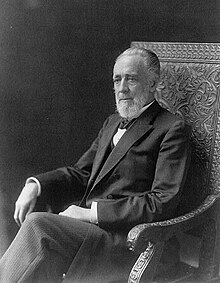Henry Teller | |
|---|---|
 | |
| United States Senator from Colorado | |
| In office March 4, 1885 – March 3, 1909 | |
| Preceded by | Nathaniel P. Hill |
| Succeeded by | Charles J. Hughes Jr. |
| In office November 15, 1876 – April 17, 1882 | |
| Preceded by | Seat established |
| Succeeded by | George M. Chilcott |
| 15th United States Secretary of the Interior | |
| In office April 18, 1882 – March 3, 1885 | |
| President | Chester A. Arthur |
| Preceded by | Samuel J. Kirkwood |
| Succeeded by | Lucius Lamar |
| Personal details | |
| Born | May 23, 1830 Granger, New York, U.S. |
| Died | February 23, 1914 (aged 83) Denver, Colorado, U.S. |
| Resting place | Fairmount Cemetery |
| Political party | Republican (1876–1897) Silver Republican (1897–1903) Democratic (1903–1909) |
| Signature | |
| Military service | |
| Allegiance | |
| Branch/service | Colorado Militia |
| Years of service | 1864–1867 |
| Rank | Major General |
| Battles/wars | Colorado War |
Henry Moore Teller (May 23, 1830 – February 23, 1914) was an American politician from Colorado, serving as a U.S. senator between 1876–1882 and 1885–1909, also serving as Secretary of the Interior between 1882 and 1885. He strongly opposed the Dawes Act, intended to break up communal Native American lands and force assimilation of the people, accurately stating that it was directed at forcing the Indians to give up their land so that it could be sold to white settlers. Among his most prominent achievements was authoring the Teller Amendment which definitively stated that, following the Spanish–American War, the United States would not annex Cuba, rather that the purpose of their involvement would be to help it gain independence from Spain.